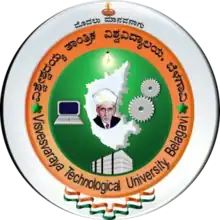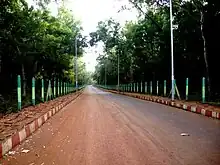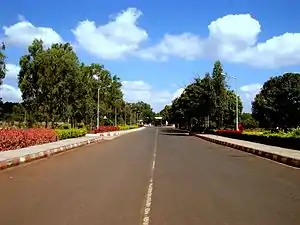Visvesvaraya Technological University
Visvesvaraya Technological University (VTU), previously spelled Visveswaraiah Technological University, is a collegiate public state university in Belagavi, Karnataka established by the Government of Karnataka. All colleges in the State of Karnataka imparting education in Engineering or Technology, except those that have the consent of VTU and sanction of the Government, are required to be affiliated with Visvesvaraya Technological University, Belagavi.[10] The university is named after Sir M. Visvesvaraya, an Indian civil engineer, statesman and the 19th Diwan of Mysore. VTU is one of the largest technical universities which provides opportunities for engineering students and management students.
Former names | Visveswaraiah Technological University |
|---|---|
| Motto | Modalu manavanagu |
Motto in English | Above all, be human |
| Type | Public |
| Established | 1 April 1998[1][2] |
Academic affiliations | UGC,[3] AICTE, ACU,[4] AIU[5] |
| Chancellor | Governor of Karnataka[6] Thawar Chand Gehlot |
| Vice-Chancellor | Dr. S Vidyashankar[7] |
| Students | 85,715[8] |
| Undergraduates | 72,888[8] |
| Postgraduates | 12,248[8] |
| 579[8] | |
| Location | , India 15°46′43.72″N 74°27′43.53″E |
| Campus | 378 acres (153 ha) (all campuses)[9] |
| Colours | Orange, white, green |
| Website | vtu |
 | |
History
Visvesvaraya Technological University (VTU) was established by the Government of Karnataka on 1 April 1998 with its headquarters at Belagavi, as per the provisions of the Visvesvaraya Technological University Act, 1994, an Act to establish and incorporate a university in the State of Karnataka for the development of engineering, technology and allied sciences. For effective administration, four regional offices at the four revenue divisional headquarters, namely, Belagavi, Bangalore, Mysore and Gulbarga were established. VTU was established by the Government in order to promote planned and sustainable development of technical education consistent with state and national policies and bringing various colleges affiliated earlier to different universities, with different syllabi, different procedures and different traditions under one umbrella.[11]
Campus
As per the provisions of the VTU Act 1994, the headquarters of the university is at Belagavi, Karnataka. The VTU headquarters is named “Jnana Sangama”. Additionally, the university has three regional centres in Bangalore, Kalaburagi and Mysore. Visvesvaraya Institute of Advanced Technology, also known as VIAT, is a research institute being constructed near Muddenahalli, Karnataka.
| Campus | Address | Type | Campus Area |
|---|---|---|---|
| VTU Main Campus - Belagavi | Jnana Sangama, Machhe, Belagavi - 590018 | Semi-Urban | 120 acres (0.49 km2) |
| VTU Regional Center - Bangalore | RHCS Layout, Annapoorneshwarinagar, Nagarbhavi, Bangalore - 560091. | Urban | 1 acre (0.0040 km2) |
| VTU Regional Center - Mysore | Hanchya Sathagally Layout, Ring Road, Mysore - 570019. | Urban | 42 acres (0.17 km2) |
| VTU Regional Center - Gulbarga | Rajapura, Kusnoor Road, Gulbarga - 585106 | Urban | 15 acres (0.061 km2) |
| Visvesvaraya Institute of Advanced Technology (VIAT) | Muddenahalli, Singadikadirenahalli - 562103 | Rural | 200 acres (0.81 km2) |
The university also has 13 Quality Improvement Programme (QIP) centers in various affiliated colleges and 16 extension centers for offering postgraduate programs. It has around 2,305 departments recognised as research centres which are spread across its affiliated institutions in Karnataka.[12][13] The Jnana Sangama, Belagavi campus and the regional and extension centres of VTU at Bangalore, Davangere, Gulbarga and Mysore offer M.Tech, MBA, MCA and PhD programs.[14][15][16]
Academics
Academic programmes
VTU offers undergraduate engineering programs that award a Bachelor of Engineering (BE) or Bachelor of Technology (BTech) degree. The university offers postgraduate programs that lead to Master of Technology (MTech), Master of Architecture (MArch) Master of Science (MSc) by research, Master of Business Administration (MBA), Master of Computer Applications (MCA) and doctorate (PhD). The MSc and PhD are research degrees while the rest are taught degrees.[17]
Undergraduate courses
The university has 12 undergraduate boards which offer Bachelor of Engineering (B.E.) programs and one undergraduate board which offers Bachelor of Architecture (BArch) course:
| Board | Undergraduate courses in English medium[18] |
|---|---|
| Architecture‡ | Architecture |
| Automobile Engineering | Automobile Engineering |
| Biotechnology | Bio-technology |
| Civil Engineering | Ceramics & Cement Technology, Civil Engineering, Environmental Engineering |
| Chemical / Polymer Engineering | Chemical Engineering, Silk Technology, Textile Technology, Polymer Science & Technology |
| CSE / ISE | Computer Science & Engineering and Information Science & Engineering |
| Electrical Engineering | Electrical & Electronics Engineering |
| Electronics & Communication Engineering | Electronics & Communication Engineering, Telecommunication Engineering |
| IPE / IEM / MA | Industrial & Production Engineering, Industrial Engineering & Management, Manufacturing Science & Engineering |
| IT / BM / ML | Biomedical Engineering, Instrumentation Technology, Medical Electronics |
| Mechanical Engineering | Aeronautical Engineering, Mechanical Engineering, Mining Engineering, Precision Engineering, Printing Technology, Tool Engineering |
| Mechatronics Engineering | Mechatronics Engineering |
‡ The Architecture board offers the BArch course.
Postgraduate courses
The university has 11 postgraduate boards which offer Master of Technology (M.Tech.) programs:
| Board | Postgraduate programs in English medium[19] |
|---|---|
| Civil Engineering | Computer Aided Design of Structure, Construction Technology, Environmental Engineering, Geo-Informatics, Highway Technology, Structural Engineering, Transportation Engineering And Management, Infrastructure construction and management. |
| Chemical Engineering | Chemical Engineering |
| Computer Science and Engineering | Computer Engineering, Computer Network Engineering, Computer Science and Engineering, Information Technology, Software Engineering |
| Electrical Engineering | Computer Applications in Industrial Drives (ECD), Energy Systems & Management (EEM), Microelectronics and Control Systems (EMS), Power Electronics (EPE), Power Systems, Engineering (EPS) |
| Electronics & Communication Engineering | Digital Communication Engineering, Digital Communication & Networking, Digital Electronics, Digital Electronics & Communication, Digital Electronics & Communication Systems, Electronics, Industrial Electronics, Information & Communication System, Network & Internet Engineering, VLSI Design & Embedded Systems, Signal Processing, Communication Systems, Intelligent Systems |
| IP Engineering | Manufacturing Science & Engineering (MSE), Master of Engineering Management (MEM), Product Design & Manufacturing (MPD), Production Engineering & System Technology (MPT), Production Engineering (MPE), Production Management (MPM), Production Technology (MPY) |
| IT Engineering | Biomedical Signal Processing & Instrumentation |
| MBA | Master Of Business Administration |
| MCA | Master of Computer Applications |
| Mechanical Engineering | Computational Analysis in Mechanical Sciences, M.Tech. in Aeronautical Engineering (MAE), Industrial Automation and Robotics (MAR), Computer Integrated Manufacturing (MCM), Design Engineering (MDE), Engineering Analysis (MEA), Machine Design (MMD), Thermal Power (MTP), Tool Engineering (MTE) |
| Textile Technology | Textile Technology |
Scheme and syllabus
Visvesvaraya Technological University accomplished its primary task of setting a common syllabus across the state in 1998. The university regularly revises the syllabus keeping in view technology upgrades around the world. The syllabus has been updated in 2002, 2006, 2010, 2014, 2015, 2017, 2018 and 2021. VTU adopted a Choice Based Credit System (CBCS) for students admitted to the university from the academic year 2015–2016.[20] The CBCS provides a choice for students to select from the prescribed courses (i.e. core, elective, foundation and mandatory non-credit courses). As part of the new CBCS scheme, VTU also moved to a Cumulative Grade Point Average (CGPA) grading system from the previous system of awarding percentage and class to students. VTU has also made an internship of eight weeks mandatory for undergraduate and postgraduate engineering students in affiliated colleges.[21]
Grading
For students matriculating since the academic year 2015–2016, VTU adopts an absolute grading system wherein the marks are converted to grades, and every semester results are declared with a semester grade point average (SGPA) and a Cumulative Grade Point Average (CGPA). To obtain a degree, in addition to clearing all the subjects, a student must also obtain a minimum CGPA of five (5.0).
| Level | Outstanding | Excellent | Very Good | Good | Above Average | Average | Poor | Fail |
|---|---|---|---|---|---|---|---|---|
| Letter Grade | S+ | S | A | B | C | D | E | F |
| Grade Points | 10 | 9 | 8 | 7 | 6 | 5 | 4 | 00 |
| Score (Marks) Range (%) | ≥ 90 | < 90 ≥ 80 | < 80 ≥ 70 | < 70 ≥ 60 | < 60 ≥ 50 | < 50 ≥ 45 | < 45 ≥ 40 | < 40 |
Prior to the introduction of the Choice Based Credit System, students were awarded a percentage and a class, as defined:
- First class with distinction (FCD): Not less than 70% of the aggregate marks in first attempt
- First class (FC): Less than 70% but not less than 60% of the aggregate marks in first attempt
- Second class (SC): Less than 60% of the aggregate marks in first attempt
Collaborations
The university has signed MoUs with multinational corporations like IBM, Intel Asia Electronics Inc., Ingersoll-Rand (India) Ltd., Bangalore, Nokia, Bosch Rexroth and Microsoft to improve the industry interactions for students and teachers.[12][23]
VTU is also a member of Association of Indian Universities and Association of Commonwealth Universities.[24][25]

Organisation and administration
Governance
VTU is administered by its Executive Council and Academic Senate whose members are selected from the academic community and government officials.[26] The present chancellor is Sri Thawar Chand Gehlot, Governor of Karnataka state and the vice-chancellor is Dr. S. Vidyashankar. [6][26]
Affiliated colleges
As of 2021, there are 219 colleges affiliated to the university (107 under Bangalore region, 34 under Belagavi region, 18 under Gulbarga region and 60 under Mysore region).[27] The colleges are categorised as 'government', 'private-aided' and 'private-unaided' based on the type of funding. A few colleges may be classified as 'minority linguistic' and 'minority religious' based on the minority status of languages and religions.[28][29] Further, these colleges are placed under 'autonomous' and 'non-autonomous' category of institutions granted by UGC.[30] There are 25 autonomous colleges affiliated to VTU.[31]
See List of colleges affiliated to Visvesvaraya Technological University
Examinations
Exams are conducted twice a year for all affiliated non-autonomous colleges. Odd semester exam is conducted during December and January. Results usually published in February. Even semester exams are conducted during May/June; results are published in July.[32][33]
Centres of excellence
The university has signed MoUs with international organisations (such as CANEUS International) and multinational corporations (like IBM, Intel Asia Electronics Inc., Ingersoll-Rand (India) Ltd., Bangalore, Nokia, Bosch Rexroth and Microsoft) and has set up centres of excellence.[34][35][36][37]

Visvesvaraya Institute of Advanced Technology
Visvesvaraya Institute of Advanced Technology (VIAT) is a research institute being constructed in Muddenahalli, Karnataka. The institute is on 200 acres (0.81 km2) of land near Nandi Hills and is expected to cost 600 crores.[38][39] In the initial years, VIAT will focus on research in embedded technology, software quality, agricultural engineering and bioengineering. Each department will function as a 'discovery-innovation centre.' The institute will offer graduate and PhD programs in the sciences.
Student life
Vice-Chancellors
| No. | From | To | Name | Position previously held |
|---|---|---|---|---|
| 1 | 1 April 1998 | 30 March 2001 | Dr. S. Rajashekharaiah[41][42] | Principal,
Basaveshvara Engineering College, Bagalkot[41] |
| 2 | 1 April 2001 | 30 June 2007 | Dr. K. Balaveera Reddy[43] | Professor, Department of Mechanical Engineering, |
| 3 | 1 July 2007 | 30 June 2010 | Dr. H. P. Khincha[45] | Chairman, Division of Electrical Sciences, |
| 4 | 1 July 2010 | 14 March 2016 | Dr. H. Maheshappa[47] | Principal, Cambridge Institute of Technology, Bangalore[47] |
| 5 | March, 2016 | May, 2016 | Dr. Shekarappa A H G (In-Charge Vice Chancellor)[48][49][50] | Principal, Sheik College of Engineering, Belagavi [48][49] |
| 6 | 5 May 2016 | Sep, 2016 | Dr. V. Sridhar (In-Charge Vice Chancellor)[48][49][50] | Principal, P.E.S College of Engineering, Mandya[48][49] |
| 7 | Sep, 2016 | Sept, 2022 | Prof. Karisiddappa[51][52][53] | Principal, Government Engineering College, Hassan[53] |
| 8 | Sept 2022 | Present | Dr. Vidyashankar | VC, KSOU |
See also
References
- "About VTU". vtu.ac.in.
- "Academic Dept".
- "University". Archived from the original on 27 December 2021. Retrieved 16 February 2022.
- "ACU members".
- "Members | AIU".
- "Governing Bodies".
- "Officers of the University".
- "University Student Enrollment Details". www.ugc.ac.in. Retrieved 10 February 2020.
- "Profile of the University" (PDF). vtu.ac.in.
- "THE VISVESVARAYA TECHONOLOGICAL UNIVERSITY ACT, 1994" (PDF).
- "Vision, Mission and Mandate". vtu.ac.in.
- "About VTU". Archived from the original on 10 October 2011. Retrieved 15 October 2011.
- "Archived copy" (PDF). Archived from the original (PDF) on 2 November 2011. Retrieved 29 October 2011.
{{cite web}}: CS1 maint: archived copy as title (link) - "ANNq" (PDF). Retrieved 29 October 2011.
- "Archived copy" (PDF). Archived from the original (PDF) on 6 April 2012. Retrieved 4 October 2011.
{{cite web}}: CS1 maint: archived copy as title (link) - "Degree Awarded".
- Visvesvaraya University. "VTU syllabus, rules and regulatons". www.meramaal.com. Retrieved 23 October 2018.
- "ug scheme & syllabus 2010-11".
- Scheme & Syllabus of PG Programmes - 2010-11
- "Visvesvaraya Tech adopts credit system for flexibility". 30 October 2018.
- "Internship must for engineering students at VTU colleges".
- "Choice Based Credit System (CBCS) Regulations Governing the degree of Bachelor of Engineering/Technology(B.E./B.Tech.)" (PDF). vtu.ac.in.
- "Archived copy" (PDF). Archived from the original (PDF) on 5 October 2011. Retrieved 4 October 2011.
{{cite web}}: CS1 maint: archived copy as title (link) - "Minds - Visvesvaraya Technological University".
- Handbook of universities - Ameeta Gupta, Ashish Kumar - Google Books. 2006. ISBN 9788126906086.
- "Governing Bodies".
- "Aaffiliated Institutions".
- "Appendix - VI, Professional Colleges Information" (PDF). vtu.ac.in. Archived from the original (PDF) on 27 March 2019.
- "CET - Manual Book 69-83 Pages" (PDF). vtu.ac.in. Archived from the original (PDF) on 27 March 2019. Retrieved 29 October 2011.
- "Autonomy Cell". vtu.ac.in. Retrieved 4 April 2022.
- "Autonomous Colleges". vtu.ac.in. Retrieved 4 April 2022.
- "VTU results".
- "VTU Results". VTU. 11 April 2017.
- "Makeover for VTU engg curriculum". Deccanherald.com. 27 August 2010. Retrieved 29 October 2011.
- "Centres of Excellence". Vtu.ac.in. 18 February 2011. Retrieved 29 October 2011.
- Uday (21 May 2009). "All muddled over Microsoft- VTU MoU". All About Belgavi. Retrieved 29 October 2011.
- "VTU signs technology deal". The Times of India. 17 December 2002. Archived from the original on 7 July 2012. Retrieved 29 October 2011.
- "Foundation stone for VIAT to be laid soon". The Hindu. Chennai, India. 12 December 2008. Archived from the original on 18 August 2011.
- "An emerging educational hub". The Hindu. Chennai, India. 7 September 2009. Archived from the original on 22 January 2011.
- "Education Plus: VTU fest from Feb. 15". The Hindu. Chennai, India. 26 January 2009. Archived from the original on 25 January 2013. Retrieved 29 October 2011.
- "Rajashekharaiah leaves VTU on strong foundation". The Hindu. Chennai, India. 1 April 2001. Archived from the original on 25 January 2013. Retrieved 29 October 2011.
- "NATIONAL / KARNATAKA : Maheshappa takes over as VC". The Hindu. Chennai, India. 2 July 2010. Retrieved 29 October 2011.
- "VTU VC will complete term: Minister – Deccan Herald – Internet Edition". Archive.deccanherald.com. Retrieved 29 October 2011.
- Ashish Kumar (2006). Handbook of Universities. Atlantic Publishers & Dist. p. 632. ISBN 978-81-269-0608-6.
- "Deccan Herald – Prof Khincha is new VTU VC". Archive.deccanherald.com. Retrieved 29 October 2011.
- ORCA INFOTECH PVT LTD, www.orcainfotech.com. "Society for Innovation & Development – Indian Institute of Science, SID – IISc". Sid.iisc.ernet.in. Retrieved 29 October 2011.
- "Karnataka News : Maheshappa named Vice-Chancellor of VTU". The Hindu. Chennai, India. 1 July 2010. Archived from the original on 7 July 2010. Retrieved 29 October 2011.
- "Google Scholar". Google Scholar. Retrieved 30 August 2017.
- "V. Sridhar is in-charge VC of VTU". The Hindu. Bangalore, India. 5 May 2016. Retrieved 23 June 2016.
- "P.E.S. College of Engineering". www.pescemandya.org.
- "Karisiddappa is VTU Vice-Chancellor". The Hindu. Bangalore, India. 25 September 2016. Retrieved 25 September 2016.
- "Guv picks Karisiddappa as new V-C of VTU". Bangalore, India: newindianexpress. 25 September 2016. Retrieved 25 September 2016.
- "Welcome to Government Engineering College, Hassan - Government Engineering College, Hassan". www.gechassan.ac.in.
External links
- Official website (English)